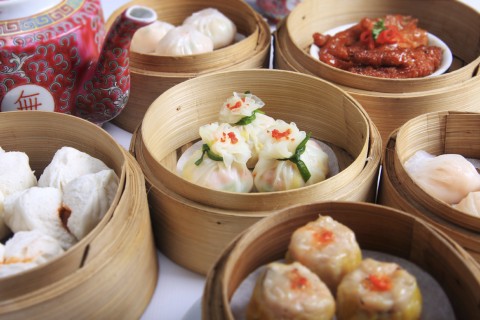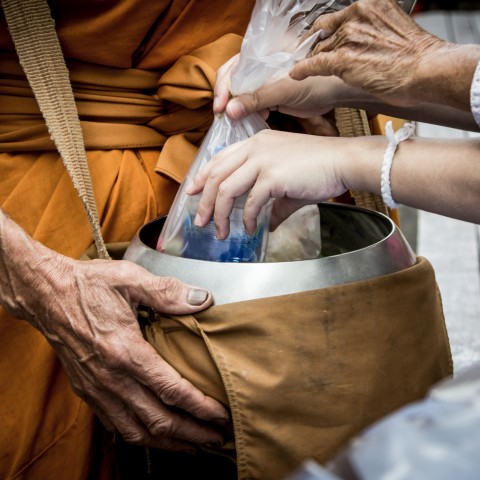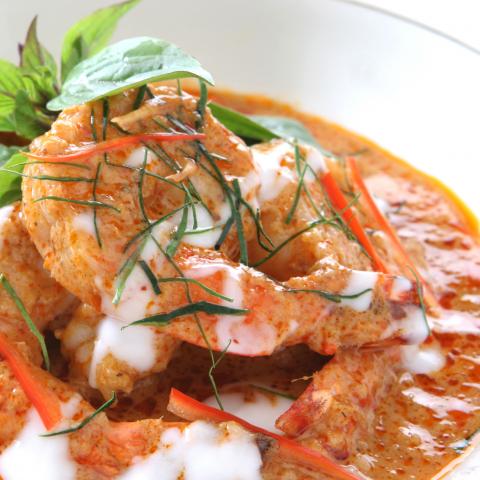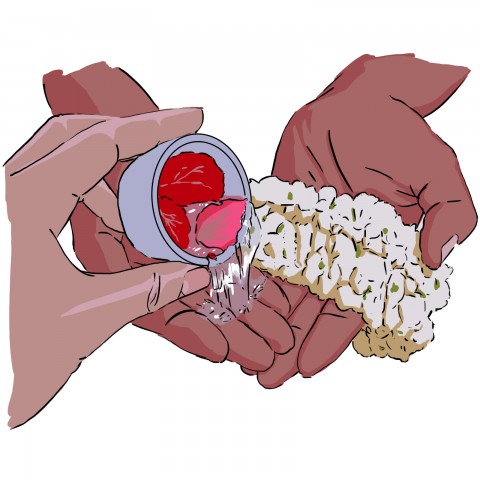
When you think of one country, what do you think about? Is it food, traditional clothes, language? People naturally think of things that represent that country, and the national anthem is one of them. Yes, you guessed it correctly, in this lesson, you will get to learn everything about the national anthem in Thailand.
Apart from being a song that represents the Thai nation, เพลงชาติไทย (phleeng-châat-thai), the Thai national anthem, also gives some insight into the history of Thailand as well. So if you are interested in Thai culture and its history, you shouldn’t miss this lesson.
The lesson will begin with Thailand’s national anthem in English, followed by the origin of the Thai national anthem and how it develops. Then, we will tell you what you should do when you hear the national anthem playing in Thai. So if you plan to come to Thailand, make sure to pay special attention to the third part. Lastly, we will give you some interesting facts about the Thai national anthem.

Learn about the national Thai anthem
 Table of Contents
Table of Contents
- Thai national anthem lyrics
- History of the Thai national anthem
- Regulation about the Thai national anthem
- Interesting facts about the Thai national anthem
- Conclusion
1. Thai national anthem lyrics
Let’s start our lesson with Thai national anthem lyrics in English. Basically, the Thai national anthem comes from poetry, and most of the words in the lyrics are not used in daily life. The same goes for the way each sentence is composed. Thai people understand the meaning of the whole, but we can’t explain the meaning of each part well.
Many of you may be curious about the meaning of Thai national anthem lyrics and may try searching its English meaning or even translating it into English by yourself. Still, the English meaning of the Thai national anthem we provide you here is a bit different. Instead of being translated literally from its lyrics, this translation comes from the interpretation (meaning) of the Thai national anthem by Lady Somroj Sawatdikul Na Ayutthaya. In our opinion, it will give you more insight into the Thai national anthem song.
Thai national anthem: ประเทศไทยรวมเลือดเนื้อชาติเชื้อไทย
Thai national anthem pronunciation: bprà-thêet-thai-ruuam-lûueat-núuea-châat-chúuea-thai
Thai interpretation: ประเทศไทยเป็นถิ่นที่รวมชนผู้มีเลือดเนื้อเชื้อชาติไทยไว้ให้ได้อยู่อาศัยร่วมกัน
English meaning: Thailand is a place in which people with Thai flesh and blood live together.
Thai national anthem: เป็นประชารัฐไผทของไทยทุกส่วน
Thai national anthem pronunciation: bpen-bprà-chaa-rát-phà-thai-khǎawng-thai-thúk-sùuan
Thai interpretation: แผ่นดินทุกส่วนของประเทศไทยย่อมเป็นของชาวไทยทุกคน
English meaning: All its land belongs to all Thai people.
Thai national anthem: อยู่ดำรงคงไว้ได้ทั้งมวล
Thai national anthem pronunciation: yùu-dam-rong-khong-wái-dâi-tháng-muuan
Thai interpretation: ประชาชนไทยรักษาแผ่นดินไทยทั้งหมดไว้ได้
English meaning: Thai people can maintain its independent (all their lands)
Thai national anthem: ด้วยไทยล้วนหมายรักสามัคคี
Thai national anthem pronunciation: dûuai-thai-lúuan-mǎai-rák-sǎa-mák-khii
Thai interpretation: ก็ด้วยทุกคนมีน้ำใจสามัคคี รักคนไทยด้วยกัน และรักประเทศชาติ
English meaning: because they are in harmony, love one another and love their country.
Thai national anthem: ไทยนี้รักสงบแต่ถึงรบไม่ขลาด
Thai national anthem pronunciation: thai-níi-rák-sà-ngòp-dtàae-thǔeng-róp-mâi-khlàat
Thai interpretation: ชนไทยรักที่จะอยู่อย่างสุขสงบ แต่ถ้าจำเป็นต้องรบกับศัตรูแล้วคนไทยไม่เคยขลาดกลัวเลย
English meaning: Thai people love living peacefully but if they need to fight the enemies, they are not cowards.
Thai national anthem: เอกราชจะไม่ให้ใครข่มขี่
Thai national anthem pronunciation: èek-gà-râat-jà-mâi-hâi-khrai-khòm-khìi
Thai interpretation: ไม่มีวันยอมให้ศัตรูหน้าไหนมาข่มขู่ทำลายความเป็นอิสระของชาติไทยได้
English meaning: They don’t let any enemies threaten its independence.
Thai national anthem: สละเลือดทุกหยาดเป็นชาติพลี
Thai national anthem pronunciation: sà-là-lûueat-thúk-yàat-bpen-châat-phlii
Thai interpretation: ทุกคนยอมสละเลือดทุกหยดเพื่อชาติไทยอยู่ยั่งยืน
English meaning: Everyone is willing to sacrifice their blood for the nation.
Thai national anthem: เถลิงประเทศชาติไทยทวีมีชัย ชโย
Thai national anthem pronunciation: thà-lǒoeng-bprà-thêet-châat-thai-thá-wii-mii-chai chá-yoo
Thai interpretation: จะปกป้องคุ้มครองประเทศไทยให้เจริญรุ่งเรืองยิ่งๆ ขึ้นไป และให้มีแต่ชัยชนะตลอดไป
English meaning: They will protect Thailand, making it even more prosperous and be victorious forever.
2. History of the Thai national anthem
1- Origin of the Thai national anthem
During the absolute monarchy (before 1932), the royal anthem of Thailand or เพลงสรรเสริญพระบารมี (pleeng-sǎn-sǒoen-phrá-baa-rá-mii) was considered to be the national anthem for all practical purposes.
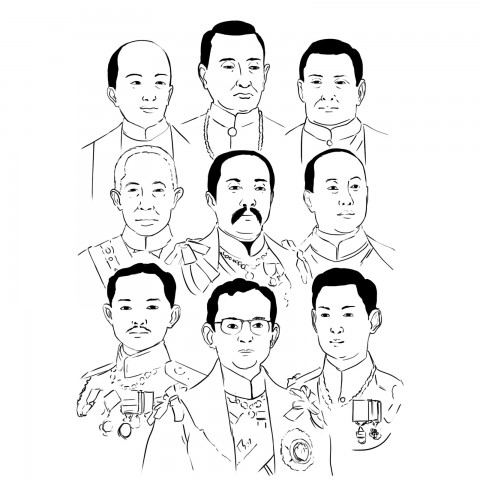
Thai royal anthem was considered to be the Thai national anthem in the past.
After Thailand became a democratic country from the Siamese revolution in 1932, the revolutionary council declared the Thai national anthem should be used instead of the Thai King’s anthem. The first version was used for only 7 days before being changed due to its unpopularity.
One of the revolutionary council members asked Pithi Wathayakon, who was very well-known in the music industry at that time, to compose Thailand’s national anthem. For the lyrics, it is believed that Sanga Kanjanakphan was the writer. Despite its popularity, this version of the Thai national anthem was not used officially.
2- The first official version of the Thai national anthem
In 1933, the government held a contest for the Thai national anthem. There were 2 types of national anthems in the contest which were: a Thai-styled national anthem, composed of Thai musical instruments, and an international version of the national anthem.
For the Thai-styled national anthem, มหานิมิตร (Mahanimitr), composed by Jangwangthua Pathayagoson, won the first-place award. For the international version, only the lyrics were changed, and the winner was Sanga Kanjanakphan, with the first runner-up being Chan Khamwilai. The lyrics for both were composed in the form of a Thai octameter poem.
In the end, using 2 versions of the national anthem was not considered to be the best decision, so only the international version was used. However, when combining the lyrics of both Sanga Kanjanakphan and Chan Khamwilai, the national anthem became too long. It took almost 4 minutes to sing, so most people sang only the lyrics written by Sanga Kanjanakphan.
Below here are the official lyrics of Thai national anthem,
แผ่นดินสยามนามประเทืองว่าเมืองทอง ไทยเข้าครองตั้งประเทศเขตต์แดนสง่า
สืบชาติไทยดึกดำบรรพ์บุราณลงมา ร่วมรักษาเอกราษฎร์ชนชาติไทย
บางสมัยศัตรูจู่มารบ ไทยสมทบสวนทัพเข้าขับไล่
ตะลุยเลือดหมายมุ่งผดุงผะไท สยามสมัยบุราณรอดตลอดมา
อันดินแดนสยามคือว่าเนื้อของเชื้อไทย น้ำรินไหลคือว่าเลือดของเชื้อข้า
เอกราษฎร์คือกระดูกที่เราบูชา เราจะสามัคคีร่วมมีใจ
ยึดอำนาจ กุมสิทธิ์อิสสระเสรี ใครย่ำยีเราจะไม่ละให้
เอาเลือดล้างให้สิ้นแผ่นดินของไทย สถาปนาสยามให้เทิดชัยไชโย
3- Shortened version of the Thai national anthem
In 1935, the government implemented a new regulation about the national anthem. The full version of the national anthem was used in some big ceremonies only. The shortened version, which is a 10-second-long instrumental, was used with people-related ceremonies.
4- The current version of the Thai national anthem
In 1939, the name of Thailand was changed from สยาม (sà-yǎam) to ไทย (thai), resulting in the change of national anthem’s lyrics. The Thai government held a contest for lyrics of the national anthem and the winner was Nuan Pajinphayak. This version of the Thai national anthem was officially used from 10 December 1939 all the way until now, the present. In Thailand, the national anthem is performed by a brass band.
3. Regulation about the Thai national anthem
There are no laws in Thailand about the national anthem, but there have been some regulations since the World War II period. It is stated that the Thai national anthem is one of the signals for paying respect to the national flag, so people should:
- Pay respect to the national flag by standing still and facing toward the national flag or its location when the flag is being raised or lowered.
- Stand still until the song is finished when hearing the anthem.
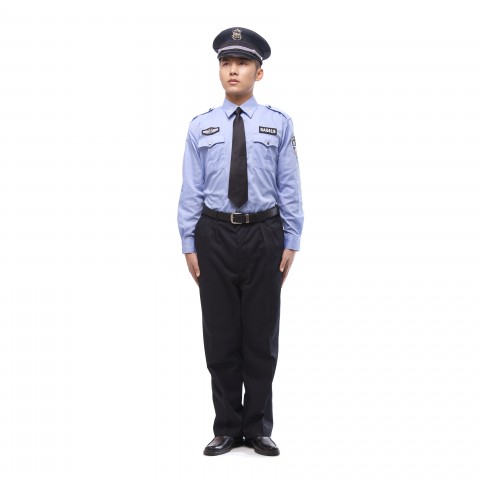
This is how you stand when you hear the Thai national anthem
Normally, the national anthem is played twice a day at 8 am., when the national flag is raised, and at 6 pm., when the national flag is lowered. If you come to Thailand, you will get to hear the national anthem playing in official places such as schools, police stations, etc., as well as through national television and radio. If you are in public when you hear the Thai national anthem, all you have to do is stand still until the song ends. Don’t worry about not recognizing the Thai national anthem. You will notice if everyone suddenly stands still with a song in the background, so just copy them.

Thai national flag in front of government office.
4. Interesting facts about the Thai national anthem
As the Thai national anthem is played daily, there are some interesting activities related to it, as listed below,
1- Introduction to the Thai national anthem
Before the Thai national anthem is played on national television or radio, there is always an introductory speech being spoken, like the one below:
Thai introduction: ธงชาติและเพลงชาติไทย เป็นสัญลักษณ์ของความเป็นไทย
Thai introduction pronunciation: thong-châat-láe-phleeng-châat-thai bpen-sǎn-yá-lák-khǎawng-kwaam-bpen-thai
English meaning: Thai national flag and the Thai national anthem are the symbols of the Thai nation.
Thai introduction: เราจงร่วมใจกันยืนตรงเคารพธงชาติ ด้วยความภาคภูมิใจในเอกราช และความเสียสละของบรรพบุรุษไทย
Thai introduction pronunciation: rao-jong-rûuam-jai-gan-yuuen-dtrong-khao-róp-thong-châat dûuai- kwaam-phâak-phuum-jai-nai-èek-gà-râat láe-kwaam-sǐia-sà-là-khǎawng-ban-phá-bù-rùt-thai
English meaning: We all should stand still to pay respect to the national flag with a proud feeling of our independence and of the sacrifices of our ancestors.
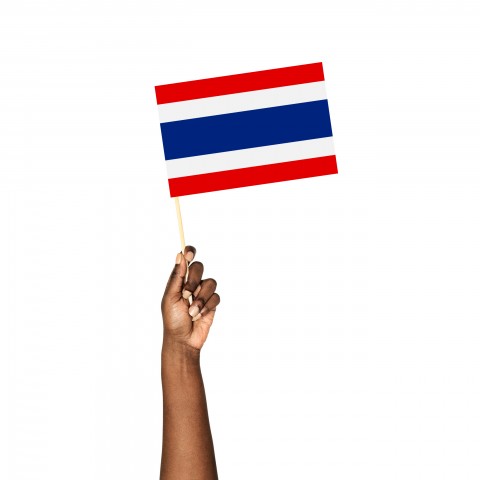
Thai national flag is the symbol of the Thai nation.
2- Paying respect to the Thai national anthem at school
In every school in Thailand, there is a national flag. Every morning, the Thai national flag should be raised due to the regulation mentioned above. Thai students do an activity called เคารพธงชาติ (khao-róp-thong-châat). Basically, all students gather in line and sing the national anthem while the national flag is being raised.
In some schools, students and teachers just sing the national anthem. In other schools, the national anthem is played, and everyone sings along. In a big school with a brass band, the national anthem is played every morning.
5. Conclusion
This is the end of this lesson and hopefully, you understand more about the Thai national anthem and the activities related to it. When I grew up, I kind of assumed the activities related to the national anthem in each country were the same. Of course, I was wrong, so please share your national anthem customs in the comments below. How often is it being played, and on which occasion? What is the meaning of your national anthem? How long is it?
Now that you have knowledge about the Thai national anthem let’s browse other interesting and fun lessons at ThaiPod101.com. If you don’t have any ideas, we suggest Thai dialects, Loy Krathong Day, and Thai drinks.




















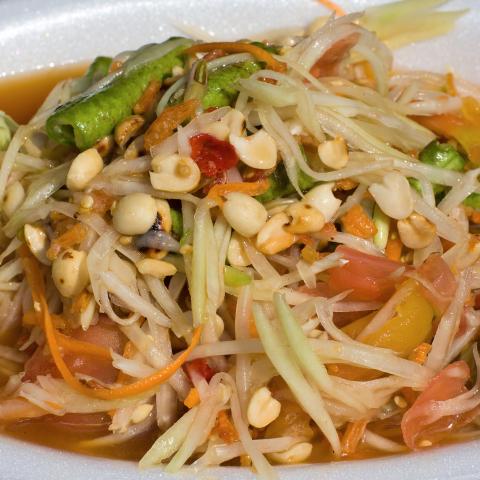

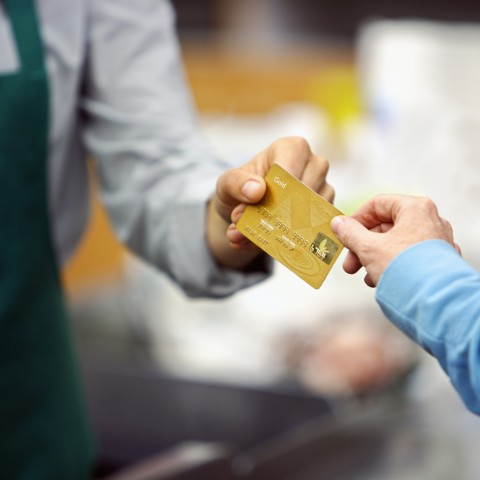

 Table of Contents
Table of Contents


























